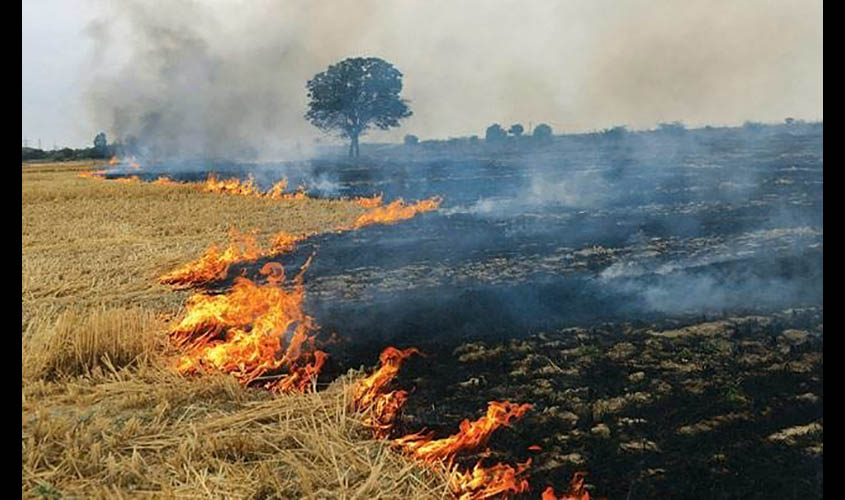The need of the hour is systemic, systematic, and rational approach to the problem of crop burning.
Of all the statements made by politicians and activists about stubble burning in northern states, the most infuriating one is that tends to exonerate the errant folks by regarding them as “poor farmers”. For poverty cannot and should not be a legal or moral defence.
Ola and Uber drivers pay the same penalties, which have recently been exorbitantly augmented, as do the top corporate executives for traffic offences. A few weeks ago, there was a report about a penalty of about Rs 47,000 imposed on an auto-rickshaw driver. A security guard accused of collusion in a robbery case doesn’t get acquitted on the grounds of being poor. Therefore, there is no reason that any farmer should go unpunished if he burns stubble—or, for that matter, commits any other violation—just because he is poverty-stricken.
Crop burning is a crime, and it should be dealt as such. Period. The attendant issues—what to do with the stubble, how to square with the farm cycle, how to address farm distress—can be addressed consequently, for these are structural problems whose resolution calls for structural, long-term solutions. The effects of stubble burning are immediate, and thus the solution has to be immediate short-term. That doesn’t seem to be happening.
This is not surprising. The entire statecraft, being wedded to welfarism, has become reactive, its defining feature being ad hocism. Farm fires should have been recognised long ago, and tackled as such; they, however, came to centre stage not just because they are polluting and dangerous to flora and fauna; this happened because the smoke—literally—reached Delhi.
The system is not even properly reactive. Fire-fighting seems to be the only mode that the authorities in India adopt in their response to grave problems. So, in order to combat rising air pollution because of crop burning in Punjab and Haryana, an emergency measure was put in place. Called the Graded Response Action Plan or GRAP, it stipulates several steps like stopping garbage burning in landfills and other places and enforcing all pollution control regulations in brick kilns and industries. To little effect.
Our political masters also wake up to the big problem of stubble burning in northern states only in October or November, when only emergency plans could be executed. For years, they have ignored this multidimensional problem. The last two or three months of the calendar year, once the most pleasurable in Delhi and the surrounding areas, become a hellish experience for millions of people. Combined with vehicular pollution, industrial emissions, and ambient dust, the entire region becomes a gas chamber. Evidently, the well-being of millions of people in North India is a concern neither for politicians nor for the farmers who burn stubble.
Crop burning happens because farmers can’t afford the alternatives to it. So, the real solution is augmentation of their revenues, which the Narendra Modi government says it is committed to. It says that it wants to double their incomes by 2022. But there is a gulf between its profession and the policies it promotes. The need of the hour is structural change—opening up the sector, phasing out government controls, and allowing farmers to do whatever they want to do to earn higher profits.
In India, governments don’t listen to its own advisers, especially if they are sensible. Arvind Panagariya, handpicked by the ruling dispensation to become the first head of Niti Aayog, is an arduous champion of change in farm policy; he wants the minimum support prices (MSPs) to go and market access for the agriculturist to increase. Little has been done in this regard; it looks like he got frustrated and quit government.
Similarly, Ashok Gulati was appointed as chairman of the Commission for Agricultural Costs and Prices by the Manmohan Singh government in 2011. He gets along with the present dispensation as well. He was appointed as Director on the Board of the Reserve Bank of India by the government in 2017 as also on the Board of Nabard in the same year. The Prime Minister also appointed him as member of high level committee on restructuring of Food Corporation of India in 2014. Like Panagariya, Gulati is also a champion of reforms in agriculture.
To no avail, for politicians of all parties persist with the policies and practices that have plagued the farm sector in the first place: free or cheap electricity, fertiliser subsidy, MSPs, cheaper credit (and frequent loan waivers), exemption from paying income tax, and so on. What is needed is liberalisation in the sector; what politicians offer are sops, which necessitate more controls.
It is a well-known and well-documented fact that statist measures like free power and MSPs have contributed, directly and indirectly, to various difficulties, ranging from groundwater depletion and electricity board losses to crop burning. Little has been done to dispense with statism.
The need of the hour is systemic, systematic, and rational approach to the problem of crop burning. What we have, instead, is an ad hoc and sentimentalist approach. Hence the poor-farmer excuse.
Ravi Shanker Kapoor is Editor, www.thehinduchronicle.com

